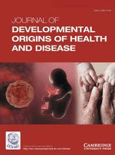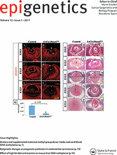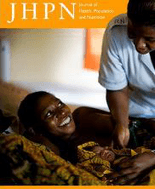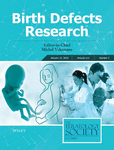
Journal of Developmental Origins of Health and Disease
Scope & Guideline
Bridging Developmental Biology and Public Health
Introduction
Aims and Scopes
- Developmental Programming:
Research within the DOHaD framework explores how factors during pregnancy and early childhood, such as maternal nutrition and stress, program health outcomes in offspring. - Intergenerational Health Impacts:
The journal investigates how health conditions and nutritional statuses can be transmitted across generations, highlighting the significance of maternal and paternal influences on offspring health. - Epidemiological Studies:
A significant focus is placed on large cohort studies that assess the long-term effects of early-life exposures, including maternal health, environmental toxins, and socioeconomic factors on later-life diseases. - Molecular and Genetic Mechanisms:
Studies often delve into the molecular underpinnings of developmental origins, including epigenetics and gene expression changes associated with early environmental exposures. - Public Health and Policy Implications:
The journal aims to translate research findings into public health strategies and policies that can mitigate the adverse effects of early-life risk factors on population health.
Trending and Emerging
- Epigenetics and Gene Regulation:
Research focusing on epigenetic mechanisms, including DNA methylation and histone modifications, is on the rise, highlighting their role in mediating the effects of early-life exposures on long-term health. - Impact of the COVID-19 Pandemic:
Recent publications have started to explore the developmental health implications of the COVID-19 pandemic, including maternal health and child development, reflecting a growing concern over the pandemic's long-term effects. - Microbiome Research:
There is an increasing interest in the role of the microbiome in developmental health, particularly how maternal and early-life exposures influence gut health and subsequent metabolic and immune outcomes. - Translational Research and Public Health Interventions:
The journal is increasingly emphasizing studies that translate findings into actionable public health strategies, demonstrating a commitment to bridging research with real-world applications. - Social Determinants of Health:
Emerging themes include the exploration of social and environmental determinants of health, particularly how socioeconomic factors influence developmental health trajectories.
Declining or Waning
- Traditional Nutritional Studies:
There has been a noticeable reduction in publications solely focused on traditional nutritional studies without considering the broader DOHaD implications, as researchers increasingly integrate molecular and epigenetic dimensions into their work. - Animal Models of Developmental Programming:
Although animal studies remain relevant, there seems to be a waning interest in purely experimental studies without translational implications, as the journal increasingly favors studies that connect animal findings to human health outcomes. - Single-Factor Exposures:
Research examining single environmental or dietary factors in isolation is becoming less prominent, with a shift towards multi-factorial studies that assess the combined effects of various exposures on health. - Short-Term Health Outcomes:
The focus on immediate health outcomes is decreasing, as the journal emphasizes long-term health trajectories and the chronic disease implications of early-life exposures.
Similar Journals

Epigenetics
Exploring the Interplay of Genes and EnvironmentEpigenetics, published by Taylor & Francis Inc, is a leading journal in the fields of Cancer Research, Medicine (miscellaneous), and Molecular Biology. With an ISSN of 1559-2294 and an E-ISSN of 1559-2308, this journal has been paving the way for groundbreaking research since its inception in 2006, and it continues to play a crucial role in advancing our understanding of epigenetic mechanisms and their implications in health and disease. The journal is highly regarded, ranking in the Q1 category for Medicine and Q2 for both Cancer Research and Molecular Biology according to the 2023 category quartiles. Researchers and professionals in the field will find invaluable insights and innovative studies within its pages, making it an essential resource for those engaged in cutting-edge research. Although the journal is not open access, it encourages a comprehensive understanding through high-quality peer-reviewed content. With its creative exploration of the epigenetic landscape, Epigenetics serves as a vital platform for the sharing of knowledge that could lead to breakthroughs in treatments and therapies.

Obesity
Exploring the Complexities of ObesityObesity is a premier academic journal published by WILEY, dedicated to advancing knowledge in the fields of endocrinology, nutrition, and metabolism. With an impressive impact factor and ranking in the top quartile across multiple categories, including Q1 in Endocrinology, Diabetes and Metabolism, and Nutrition and Dietetics, this journal serves as a critical resource for researchers, clinicians, and policymakers. The journal facilitates the dissemination of innovative research findings spanning the biological, behavioral, and societal factors associated with obesity, offering Open Access options to ensure broad visibility and accessibility to its content. With converged years from 2006 to 2024, Obesity provides an invaluable platform for cutting-edge studies that contribute to the global understanding of obesity and its multifaceted implications for health and wellness. Located in Hoboken, New Jersey, this esteemed journal plays a pivotal role in shaping the dialogue around obesity, making it an essential read for anyone invested in tackling this pressing public health challenge.

International Journal of Child Health and Nutrition
Elevating standards in pediatric health and nutrition studies.International Journal of Child Health and Nutrition, published by LIFESCIENCE GLOBAL, serves as an essential platform for the dissemination of research and insights related to pediatric health and nutrition. With a focus on improving the well-being of children and infants, the journal is committed to addressing critical issues that impact child health across diverse populations. Although the journal currently holds a Q4 ranking in both Maternity and Midwifery and Pediatrics, Perinatology and Child Health, it aims to enhance its visibility and impact in the academic community through future contributions. The journal invites researchers, professionals, and students alike to engage with cutting-edge studies and reviews that explore the intersection of nutrition and health outcomes in children. Currently operating as an open-access journal, this publication encourages widespread access and dissemination of knowledge, thus fostering a global dialogue on vital child health issues. Situated in Canada, the journal aspires to uphold the highest standards of research integrity and innovation through its ongoing commitment to child health and nutrition.

JOURNAL OF HEALTH POPULATION AND NUTRITION
Empowering populations with cutting-edge nutrition insights.JOURNAL OF HEALTH POPULATION AND NUTRITION, published by BMC, is a pivotal open access journal that has been disseminating impactful research since 2000. With a commitment to enhancing public health and advancing knowledge in nutrition and population health, this journal plays a critical role in addressing issues affecting health outcomes globally. It boasts an impressive impact factor evidenced by its Q2 ranking in 2023 across multiple categories, including Food Science and Public Health, indicating its relevance and influence in these fields. Based in the United Kingdom, this journal is dedicated to providing a platform for researchers and practitioners alike to share their findings and insights, thus fostering a collaborative environment focused on improving health and nutrition standards. The open access model, adopted in 2015, ensures that the valuable research published is freely available, significantly enhancing its reach and promoting widespread application of findings. With this journal's continued emphasis on multi-disciplinary research, it is an essential resource for anyone involved in the study or practice of health populations and nutrition.

DEVELOPMENT AND PSYCHOPATHOLOGY
Advancing Understanding of Developmental ChallengesDEVELOPMENT AND PSYCHOPATHOLOGY is a leading journal published by Cambridge University Press, focusing on the intricate interplay between developmental processes and psychopathological outcomes. With a prestigious position in quartile Q1 for both Developmental and Educational Psychology and Psychiatry and Mental Health, this journal continues to set the standard for rigorous research contributions. The journal aims to disseminate high-quality empirical studies, theoretical discussions, and methodological innovations relevant to understanding the complexities of human development and its relation to mental health. Spanning a broad scope, it serves as a vital resource for researchers, clinicians, and policymakers seeking to advance knowledge in these critical fields. Through its commitment to fostering interdisciplinary dialogues, DEVELOPMENT AND PSYCHOPATHOLOGY plays a pivotal role in shaping future research directions and clinical practices. The journal is accessible to a global audience, striving to enhance the visibility of research that addresses the pressing issues of developmental psychology and mental health.

BRITISH JOURNAL OF NUTRITION
Pioneering Insights for a Healthier FutureThe British Journal of Nutrition, a premier publication in the field of nutrition and dietetics, is brought to you by Cambridge University Press. Established in 1947, this journal has consistently provided a platform for groundbreaking research and innovation in the domain of nutrition, boasting an impressive converged timeline extending to 2024. Recognized for its high academic standards, it proudly holds a Q1 ranking in Medicine (miscellaneous) and a Q2 ranking in Nutrition and Dietetics as of 2023, reflecting its impact and relevance in the scientific community. With a Scopus rank of 75 out of 398 in Medicine and 38 out of 140 in Nutrition and Dietetics, the journal remains a vital resource for researchers, professionals, and students seeking to enhance their knowledge and understanding of nutritional science. While the journal is not open access, it offers a wealth of valuable insights, making it an essential addition to any academic collection focused on health and nutrition.

Environmental Epidemiology
Advancing knowledge at the intersection of environment and health.Environmental Epidemiology is a leading open-access journal published by Lippincott Williams & Wilkins, dedicated to advancing the field of environmental and public health research. Since its establishment in 2017, this journal has emerged as a vital platform for scholars and practitioners interested in the intricate relationships between environmental factors and health outcomes. With an impressive impact factor reflecting its rigorous peer-review process and a robust Scopus ranking—notably holding Q1 positions in categories such as Health, Toxicology and Mutagenesis, and Public Health—this journal is essential for those seeking to explore the latest findings and methodological advances in environmental epidemiology. Open access since 2018, it ensures wide dissemination of research findings, promoting accessibility and engagement among a global audience of researchers, policymakers, and students. As it continues to converge through 2024, Environmental Epidemiology remains committed to publishing high-quality articles that address pressing environmental health challenges, fostering interdisciplinary collaboration and knowledge sharing that is crucial for developing effective public health interventions.

Developmental Cognitive Neuroscience
Highlighting groundbreaking discoveries in developmental cognitive neuroscience.Developmental Cognitive Neuroscience is a leading interdisciplinary journal published by ELSEVIER SCI LTD, dedicated to advancing the field of cognitive neuroscience with a specific focus on the developmental aspects of brain function and behavior. Since its inception in 2011, this Open Access journal has continued to thrive, gaining significant recognition with a remarkable impact factor that places it in the Q1 category of cognitive neuroscience, ranking 22nd out of 115 in Scopus. This enhances its visibility and accessibility to a global audience, including researchers, clinicians, and students keen on exploring the intricate relationship between cognitive development and neurological processes. The journal embraces a wide array of topics, from the impact of early life experiences on cognitive outcomes to neurodevelopmental disorders, fostering an enriching platform for disseminating high-quality research and innovative findings. As it progresses towards 2024, Developmental Cognitive Neuroscience remains pivotal in shaping future research and understanding in the field.

ENVIRONMENTAL HEALTH PERSPECTIVES
Exploring the critical links between our environment and well-being.Environmental Health Perspectives (EHP) is a premier open-access journal published by the U.S. Department of Health and Human Services, Public Health Science, dedicated to publishing rigorous and impactful research in the field of environmental health. Since its inception in 1972, EHP has become a leading platform for disseminating knowledge on the interactions between the environment and human health, making significant contributions to the fields of toxicology and public health. With an impressive impact factor and a Q1 ranking in both Health, Toxicology and Mutagenesis and Public Health, Environmental and Occupational Health categories, EHP ranks among the top journals globally, reflecting its high citation and visibility within the academic community. Researchers, professionals, and students alike will find a wealth of vital information within its pages, as EHP covers a wide array of topics related to environmental exposures, health outcomes, and policy implications. Furthermore, EHP engages with a global audience through its commitment to open access, ensuring that critical research is available to all, enhancing the collective understanding of environmental health issues since 1972.

Birth Defects Research
Exploring the intricacies of developmental biology.Birth Defects Research is a premier open-access academic journal published by WILEY, dedicated to advancing the field of developmental biology and embryology, with an emphasis on understanding the mechanisms and factors influencing congenital anomalies. Since its establishment, the journal serves as a vital resource for researchers, professionals, and students alike, providing a platform for innovative research and insights in areas including pediatrics, toxicology, and health science. With an impact factor reflecting its commitment to quality, it is positioned in the Q2 and Q3 quartiles across several categories for 2023, demonstrating its relevance and influence within the scientific community. Researchers will find it particularly valuable for disseminating findings and encouraging interdisciplinary collaboration in combatting birth defects and improving child health outcomes. Accessible from the United Kingdom, the journal fosters the free exchange of information, reinforcing its goal to support the global health landscape through knowledge and innovation.